NAIROBI, Kenya (RNS) — When Pope Francis released his encyclical on the environment, “Laudato Si’,” in 2015, Muslims, Hindus and other faith leaders joined Christians in dialogues in response to the pontiff’s powerful call to tend to climate change as a matter of faith. Now, nine years later, Islamic leaders have released a counterpart to the Vatican document.
On Feb. 27, at a meeting on the sidelines of the sixth annual session of the United Nations Environment Assembly in Nairobi, Muslim scholars, U.N. officials and some Christian leaders unveiled “Al-Mizan: A Covenant for the Earth.”
“‘Al-Mizan’ … perfectly allows the global efforts to tackle the triple plenary crises,” Leila Benali, president of UNEA-6 and Morocco’s minister for energy transition and sustainable development, said in announcing the document’s release. “ … It acknowledges the severity of the triple crises, including pollution, including climate change, including biodiversity loss, nature and also injustice in sharing the resources of life.”
“Al-Mizan,” or “balance” in English, gives a Muslim perspective on how faith can inform and inspire action in the face of current global ecological challenges. It calls on Muslims and the broader global community to unite to restore ecological balance and preserve the Earth for future generations.
“Environmentalism is deeply embedded in the veins of Islam. It is about personal behavior and how it manifests itself in our association with others and also about being considerate in our relationship with the natural world and other sentient beings,” said a U.N. statement.
“Al-Mizan,” the announcement said, is based on Quranic principles of encouraging public good, forbidding wrong action and acting in moderation.

Delegates at the UNEA-6 conference navigate the United Nations Environment Programme headquarters in Nairobi, Kenya. (RNS photo/Fredrick Nzwili)
The document was drafted by scholars and members of leading Islamic organizations, including the Islamic World Educational, Scientific and Cultural Organization, the Islamic Foundation for Ecology and Environmental Sciences and Uskudar University in Istanbul. The experts were assembled by the United Nations Environmental Program’s Faith for Earth Coalition, a group that unites diverse faith groups around the issue of the environment.
“The word ‘Al-Mizan,’ the title of our treatise, means equilibrium and reciprocity. The Quran describes all beings as balanced and integrated in interconnected and interdependent equilibrium,” said Othman Llewellyn, one of its lead authors.
According to the scholar, God had unfolded all things in a balance with one another, and all things need, support and benefit the other.
“Nothing is created wantonly or in vain. All are created in truth and for right, and each has rights on us: that we care for it,” said Llewellyn, a member of the International Union for Conservation of Nature’s World Commission on Protected Areas and World Commission on Environmental Law.
Christian leaders said the document struck a balance between the Islamic worldview and the Christian perspective, particularly that of the Catholic Church.

English and Arabic copies of “Al-Mizan: A Covenant for the Earth.” (Courtesy photo)
“In many ways, ‘Al-Mizan’ is the Islamic equivalent to ‘Laudato Si’,’ the encyclical of Pope Francis, and more recently, the ‘Laudate Deum,’ a follow-up document,” Catholic Archbishop Hubertus van Megen, the apostolic nuncio in Kenya and South Sudan, told those gathered for the announcement. “‘Al-Mizan,’ although building entirely on its own profound Islamic tradition, resonates in many ways the teachings of ‘Laudato Si’.’
“In fact, I would like to invite all of you to read them in tandem, as they raise together a harmonious song of praise, who is the creator of the universe,” said van Megen.
The prelate said the new document showed believers that religion did not limit science but gave it the flesh and blood to make it vigorous and life-giving for those who believe in God.
“‘Al-Mizan’ is therefore not only about a balanced and equitable approach to nature, but its very method is also a beautiful witness to a balanced dialogue between faith and reason. These two do not exclude each other … but rather are complementary to each other, as the document abundantly shows.”





